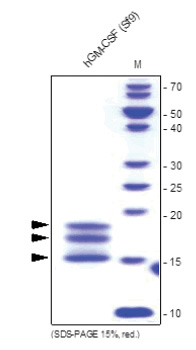GM-CSF (His-tag) Human Protein
Other products for "CSF2"
Specifications
| Product Data | |
| Species | Human |
| Expression Host | Insect |
| Tag | His-tag |
| Predicted MW | 14.6 kDa |
| Purity | >98% pure by SDS-PAGE and visualised by silver stain. |
| Presentation | Purified |
| Buffer | Presentation State: Purified State: Lyophilized without preservatives and stabilizers Buffer System: PBS |
| Bioactivity | Biological: Human GM-CSF is fully biologically active when compared to standards. Measured in a cell proliferation assay using TF-1 human erythroleukemic cells [Kitamura T et al, J Cell Physiol, 1989]. The ED50 for this effect is typically < 0.1ng/ml corresponding to a specific activity of ≥ 1 x 107 units/mg. |
| Endotoxin | < 0.1 ng per µg of GM-CSF |
| Reconstitution | The lyophilized GM-CSF is soluble in water and most aqueous buffers. The lyophilized powder can be reconstituted in water to a concentration of 0.1 mg/ml. This solution can be diluted into other buffered solutions or stored at -20°C for future use. |
| Preparation | Lyophilized without preservatives and stabilizers |
| Protein Description | Recombinant human GM-CSF. |
| Storage | Store lyophilized at 2-8°C for 6 months or at -20°C long term. After reconstitution store the antibody undiluted at 2-8°C for one month or (in aliquots) at -20°C long term. Avoid repeated freezing and thawing. |
| Stability | Shelf life: one year from despatch. |
| Reference Data | |
| RefSeq | NP_000749 |
| Locus ID | 1437 |
| UniProt ID | P04141 |
| Cytogenetics | 5q31.1 |
| Synonyms | CSF; GMCSF |
| Summary | The protein encoded by this gene is a cytokine that controls the production, differentiation, and function of granulocytes and macrophages. The active form of the protein is found extracellularly as a homodimer. This gene has been localized to a cluster of related genes at chromosome region 5q31, which is known to be associated with interstitial deletions in the 5q- syndrome and acute myelogenous leukemia. Other genes in the cluster include those encoding interleukins 4, 5, and 13. This gene plays a role in promoting tissue inflammation. Elevated levels of cytokines, including the one produced by this gene, have been detected in SARS-CoV-2 infected patients that develop acute respiratory distress syndrome. Mice deficient in this gene or its receptor develop pulmonary alveolar proteinosis. [provided by RefSeq, Aug 2020] |
| Protein Families | Druggable Genome, ES Cell Differentiation/IPS, Secreted Protein |
| Protein Pathways | Cytokine-cytokine receptor interaction, Fc epsilon RI signaling pathway, Hematopoietic cell lineage, Jak-STAT signaling pathway, Natural killer cell mediated cytotoxicity, T cell receptor signaling pathway |
Documents
| FAQs |
| SDS |
Resources
Recombinant Protein Resources |
{0} Product Review(s)
0 Product Review(s)
Submit review
Be the first one to submit a review
Product Citations
*Delivery time may vary from web posted schedule. Occasional delays may occur due to unforeseen
complexities in the preparation of your product. International customers may expect an additional 1-2 weeks
in shipping.






























































































































































































































































 Germany
Germany
 Japan
Japan
 United Kingdom
United Kingdom
 China
China
